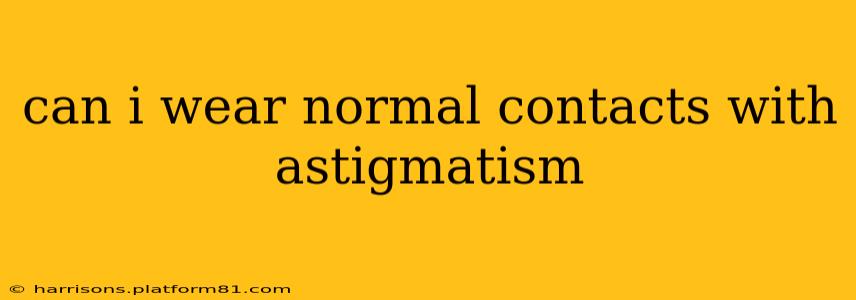Can I Wear Normal Contacts With Astigmatism?
The short answer is: no, you generally can't wear standard, spherical contact lenses if you have astigmatism. Astigmatism is a refractive error where the cornea (the clear front part of your eye) is irregularly shaped, causing blurry vision at all distances. Standard contact lenses, also known as spherical lenses, are designed to correct nearsightedness (myopia) or farsightedness (hyperopia) by focusing light evenly onto the retina. They can't effectively correct the uneven focusing caused by astigmatism.
Trying to wear spherical contacts with astigmatism will likely result in blurry or distorted vision, eye strain, headaches, and potentially even discomfort or eye irritation. Your vision won't be corrected properly, and you might experience discomfort throughout the day.
What are the Different Types of Contact Lenses?
To understand why you can't use standard contacts, let's look at the different types available:
-
Spherical Contact Lenses: These are the most basic type and correct only nearsightedness or farsightedness. They're not suitable for astigmatism.
-
Toric Contact Lenses: These are specifically designed to correct astigmatism. They have different curvatures to compensate for the irregular shape of the cornea. These lenses are the correct solution for astigmatism.
-
Multifocal Contact Lenses: These lenses correct both nearsightedness or farsightedness and presbyopia (age-related difficulty focusing on near objects). Some multifocal contacts can also correct astigmatism.
What Happens if I Try to Wear Spherical Contacts With Astigmatism?
As mentioned earlier, wearing the wrong type of contact lens can lead to several problems:
-
Blurry Vision: This is the most common issue. The uneven focusing caused by astigmatism isn't corrected, leaving your vision blurry at all distances.
-
Eye Strain and Headaches: Your eyes will have to work harder to compensate for the uncorrected astigmatism, leading to fatigue and headaches.
-
Discomfort and Irritation: The contact lenses may not sit properly on your eye's surface, causing discomfort, dryness, and irritation.
-
Increased Risk of Eye Infections: Improperly fitting lenses can increase the risk of infections and other complications.
What Type of Contact Lenses Should I Use if I Have Astigmatism?
If you have astigmatism, you need toric contact lenses. These are specially designed to correct the irregular curvature of your cornea and provide clear, sharp vision. Your eye doctor will determine the correct prescription for your toric lenses, including the power, cylinder, and axis.
How Can I Get a Prescription for Toric Contact Lenses?
The only way to obtain a proper prescription for contact lenses, including toric lenses, is through a comprehensive eye exam by a qualified optometrist or ophthalmologist. They will assess your vision and the shape of your cornea to determine the best type and prescription of contact lenses for you. Don't attempt to self-diagnose or self-prescribe.
Are There Different Types of Toric Contact Lenses?
Yes, there are various types of toric contact lenses, including daily disposables, extended-wear, and conventional replacement schedules. Your eye doctor will help you determine which type is most suitable for your lifestyle and needs. They will discuss factors like comfort, convenience, and cost.
In summary, wearing standard spherical contact lenses with astigmatism is not recommended and can lead to various vision problems and discomfort. Always consult your eye doctor to determine the appropriate type of contact lenses for your specific needs and ensure proper fitting and care.
